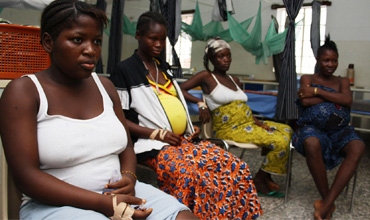Exploratory Study of Policy Process and Early Implementation of Free NH15 Coverage of Pregnant Women in Ghana

Abstract:
Review
is a critical analysis of the article “An exploration study of the policy
process and early implementation of the free NHS coverage for pregnant women in
Ghana published in international Journal for equity in health 2013.
In
this review of this article following steps were taken. It was summarized, then
was analysed for print structure by out. Lastly review did the critical
analysis of the article evaluating its authority currency, accuracy,
objectivity and coverage Tables & figures were also analysis.
References:
1.
Agyepong
I, Ngai R: “We charge them; otherwise we cannot run the hospital”:
front line workers, clients and health financing policy implementation gaps in
Ghana. Health Policy 2011, 99:226-233. PubMed
Abstract | Publisher Full Text
2.
Asenso-Boadi
F: Free maternal health care programme and its cost implications.
2009. Ref Type: Slide
3.
Atinga
R, Mensah S, Asenso-Boadi F, Adjei F: Migrating
from user fees to social health insurance: exploring the prospects and
challenges for hospital management. BMC Health Serv Res
2012, 12(174).
4.
Countdown to 2015. Building a future
for women and children: the 2012 report. Geneva: WHO and UNICEF; 2012.
5.
Dalinjong
P, Laar A: The national health insurance scheme: perceptions and
experiences of health care providers and clients in two districts of Ghana. Heal
Econ Rev 2012., 2
6.
Dzakpasu
S, Soremekun S, Manu A, Ten Asbroek G, Tawiah C: Impact of Free Delivery Care on Health Facility
Delivery and Insurance Coverage in Ghana’s Brong Ahafo Region. PLoS
One 2012, 7(11):e49430. PubMed Abstract | Publisher
Full Text | PubMed Central Full Text
7.
Ghana
Statistical Service, Ghana Health Service, ICF Macro: Ghana Demographic and
Health Survey 2008: Key Findings. Calverton, Maryland, USA: GSS, GHS, and
ICF Macro; 2009.
8. GHS: Ghana Health Service Annual Report 2009.
Accra: Ghana Health Service; 2010.
9.
Ghana
Ministry of Health: Implementation guidelines for financing free delivery
through NHIS. Accra: MoH; 2008.
10. Ghana Ministry of Health: National consultative
meeting on the reduction of maternal mortality in Ghana: partnership for action
- a synthesis report. Accra: MoH; 2008.
11. De Sardan O, Ridde V: Une comparaison provisoire
des politiques d’exemption de paiement dans trois pays sahéliens (Burkina Faso,
Mali, Nigeria). Niamey: LASDEL/CRCHUM; 2011. Report No.: Etudes et travaux
numéro 89
12. Meessen B, Hercot D, Noirhomme M, Ridde V, Tibouti A,
Tashobya C: Removing user fees in the
health sector: a review of policy processes in six sub-Saharan African
countries. Health Policy Plan 2011, 2(26):ii16-ii29.
13. NHIS: National Health Insurance Scheme website.
Accra: NHIS; 2012.
14. Ridde V, Queuille L, Kafando Y: Capitalisations de
politiques publiques d’exemption du paiement des soins en Afrique de l’Ouest.
Ouagadougou: CRCHUM/HELP/ECHO; 2012.
15. Ridde V, Richard F, Bicaba A, Queuille L, Conombo G: The
national subsidy for deliveries and emergency obstetric care in Burkina Faso. Health
Policy Plan 2011, Supplement 2(26):ii30-ii40.
16. Ridde V, Diarra A: A process evaluation of
user fees abolition for pregnant women and children under five years in two
districts in Niger (West Africa). BMC Health Serv Res 2009.
17. Ridde V, Robert E, Meessen B: A literature review of the disruptive effects of
user fee exemption policies on health systems. BMC Publ
Health 2012, 12Community of
Practice Financial Access to Health Services: Maternal health exemptions:
policy brief. Bamako: CoP FAHS; 2012.
18. Ridde V, Diarra A, Moha M: User fees abolition policy in Niger: comparing the
under five years exemption implementation in two districts. Health
Policy 2011, 99:219-225.
PubMed Abstract | Publisher Full Text
19. Schieber G, Cashin C, Saleh K, Lavado R: Health
financing in Ghana at a crossroad. Washington, D.C: World Bank; 2012.
Report 67325
20. Witter S, Arhinful D, Kusi A, Zakariah-Akoto S: The experience of Ghana in implementing a user fee
exemption policy to provide free delivery care. Reprod
Health Matters 2007, 15(30):1-11.
21. Witter S, Dieng T, Mbengue D, Moreira I, De Brouwere
V: The free delivery and caesarean
policy in Senegal – how effective and cost-effective has it been? Health
Policy Plan 2010, 25(5):384-392. PubMed Abstract | Publisher
Full Text
22. Witter S, Adjei S, Armar-Klemesu M, Graham W: Providing free maternal health care: ten lessons
from an evaluation of the national delivery exemption policy in Ghana. Global
Health Action 2009.
23. Witter S, Richard F, De Brouwere V: Learning lessons and moving forward: how to reduce
financial barriers to obstetric care in low-income contexts. Studies
in Health Services Organisation and Policy 2008, 24:277-304.
24. Witter S, Adjei S: Start-stop funding, its causes and consequences: a case study of the
delivery exemptions policy in Ghana. Int J Health Plann
Manage 2007, 22(2):133-143. PubMed Abstract | Publisher
Full Text
25. Witter S, Garshong B: Something old or something new? Social health insurance in Ghana. BMC
International Health and Human Rights 2009, 9(20).

